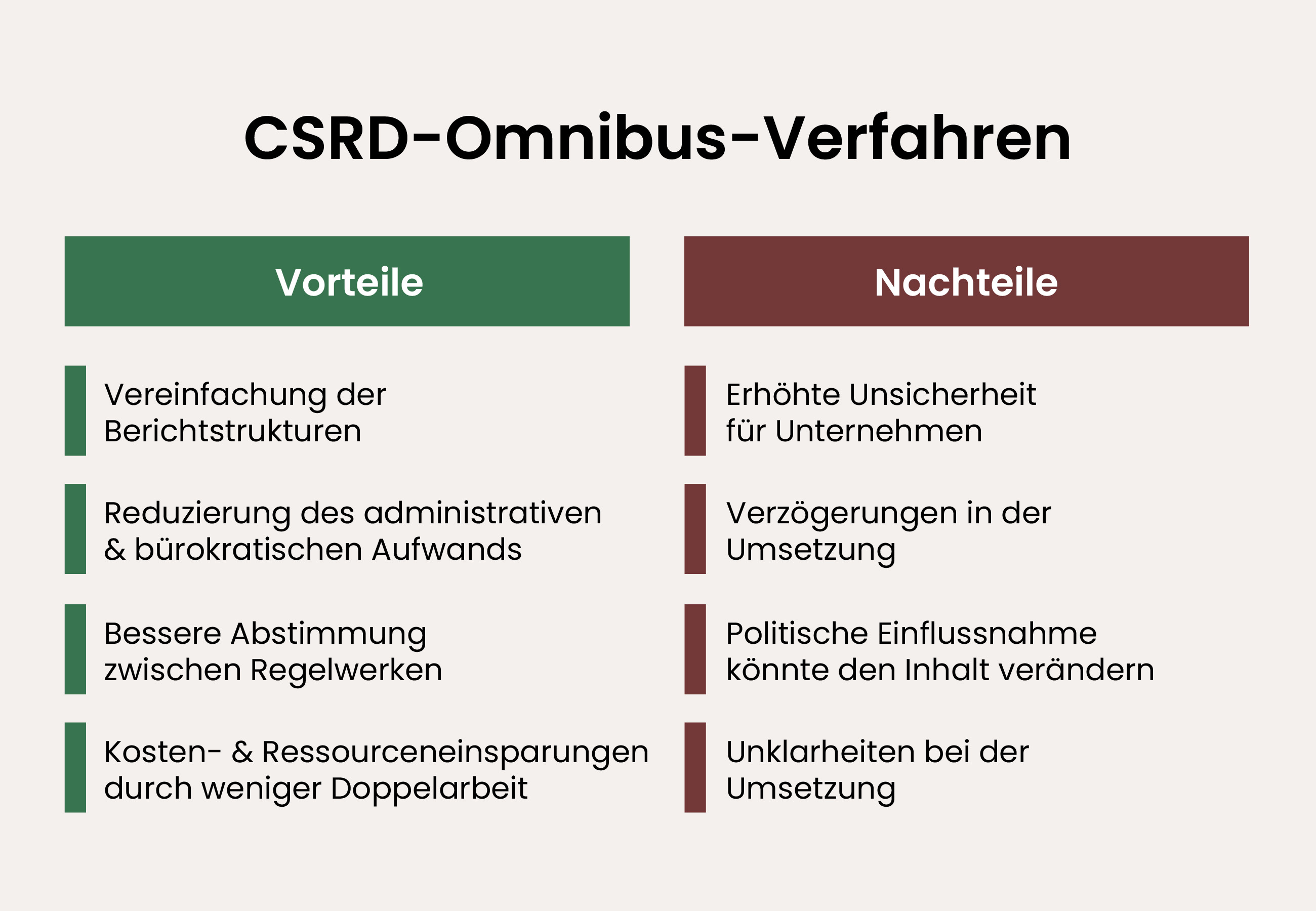Are your sustainability reports already in the starting blocks or are you wondering how your company will be affected by the EU Commission's latest changes? On February 26, 2025, the European Commission presented a far-reaching draft to simplify sustainability reporting with the Omnibus Regulation. This initiative aims to reduce bureaucratic hurdles and at the same time pave the way for a more sustainable economy. But what exactly does this mean for your company?
The topic in a nutshell
- New thresholds: companies with more than 1,000 employees (instead of the previous 250) would continue to be subject to CSRD reporting requirements. The financial criteria (€ 50 million annual turnover or € 25 million balance sheet total) remain unchanged.
- Postponement of the CSRD reporting deadlines: The deadlines will be uniformly postponed by two years (to 2028).
- Reduction of data points: Simplification of ESRSrequirements
- CSRD preparation with PlantedThanks to auditor-validated methodology and AI support, you achieve up to 70% time savings compared to Excel-based solutions and legally compliant reporting.
Are you still unsure about what to do and which changes affect you? Our guide to the Omnibus Regulation for over 1,000 employees and under 1,000 employees is available to download!
What is the Omnibus Regulation and why was it proposed?
The Omnibus Regulation is a comprehensive initiative of the European Commission that was presented on February 26, 2025. It aims to harmonize various sustainability regulations and reduce the administrative burden on companies. This initiative comes at a time when the CSRD has yet to be transposed into national law in many EU member states - including Germany - which has led to considerable legal uncertainty.
The regulation bundles and simplifies requirements from various EU regulations:
- Corporate Sustainability Reporting Directive (CSRD)
- Corporate Sustainability Due Diligence Directive (CSDDD)
- EU Taxonomy Regulation
- Sustainable Finance Disclosure Regulation (SFDR)
- EU Deforestation Regulation (EUDR)
The main aim of the Omnibus Regulation is to reduce the burden on companies, particularly small and medium-sized enterprises (SMEs). The European Commission is thus responding to criticism from the business community, which considered the original scope of the reporting obligations to be disproportionate and too complex.

Omnibus Regulation: The most important changes for companies subject to reporting requirements
The Omnibus Regulation would entail several fundamental changes that could reduce the number of companies subject to reporting requirements and significantly reduce the reporting burden. The new thresholds, the postponement of deadlines and the simplification of reporting standards are important.
New thresholds for companies subject to reporting requirements
The omnibus initiative provides for a significant increase in the threshold values for the CSRD reporting obligation:
Important: Special regulations continue to apply to capital market-oriented companies, regardless of their size, although micro-enterprises are exempt. Planted's team of CSRD experts will support you in precisely identifying and efficiently implementing the requirements relevant to your company.
Postponement of reporting deadlines to 2028
The simplification of the reporting timetable was already adopted by the EU Parliament on April 3, 2025 with the so-called "stop-the-clock" proposal. Instead of the staggered introduction in 2026 and 2027, all companies subject to reporting requirements in the second and third waves are now to start reporting uniformly in 2028. This concerns:
- Large, non-capital-market-oriented companies (originally 2026)
- Listed SMEs (originally 2027)

This deadline extension gives companies more time to systematically set up and optimize their reporting processes. Planted supports you in using this additional time effectively by implementing the necessary structures and data collection processes step by step. This means you can already benefit from the efficiency gains of digital ESG management without being under time pressure.
For companies that have already started preparations, we recommend continuing them. You can use the time gained to:
- Improve your data quality
- Strategically integrate your sustainability goals
- Provide your employees with targeted training through Planted's Climate Academy
- Optimize your processes before the reporting obligation comes into force
- Positioning yourself as a competitive leader - banks, investors and the general public are increasingly demanding transparent sustainability information from companies of all sizes, regardless of legal obligations.

Changes to the ESRS and reporting standards
A central point of the Omnibus Regulation is the simplification of the European Sustainability Reporting Standards(ESRS). The EU Commission plans to fundamentally revise the delegated act establishing the ESRS:
- Reduction of data points: The amount of information to be reported is to be significantly reduced, which will considerably reduce the workload for companies. There is also talk of only receiving quantitative data points.
- Deletion of sector-specific standards: The additional sector-specific reporting requirements originally planned are to be dropped.
- Simplification of the audit requirements: The standard for reasonable assurance is to be deleted, which will reduce the requirements for external verification of reports.
The double materiality analysis is expressly not part of the changes and remains a core component of the CSRD. This analysis identifies both the company's impact on the environment and society (inside-out perspective) and the ESG risks and opportunities for the company itself (outside-in perspective).
Your advantage with Planted: Planted's AI-supported materiality analysis was developed specifically for this requirement and validated by auditors. It automates complex assessment processes, saving up to 70% of the time compared to manual methods, while increasing your data quality and audit assurance.
Impact of the Omnibus Regulation on SMEs and companies in the supply chain
The Omnibus Regulation would bring significant relief for small and medium-sized enterprises. A simplified, voluntary reporting standard for SMEs and mid-sized companies is being developed, which is based on the existing VSME standard.
This new standard offers several advantages:

- Simplified data provision: SMEs in supply chains of companies subject to reporting requirements can provide the required sustainability information more easily.
- Reduction of the "trickle-down effect": The requirements for suppliers are limited in that only the information defined in the voluntary standard can be requested.
- Uniform structure: A standardized format facilitates data exchange and reduces the effort required for individual requests.
Planted offers customized solutions for SMEs that are not required to report directly but need to provide data to larger customers:
- Efficient data collection: Planted's collaborative ESG platform enables structured collection of relevant ESG data.
- Customer-compliant reports: Automated export functions deliver the data in the format required by reporting customers.
- Competitive advantage: With certified sustainability data, you can position yourself as a preferred supplier. Many reporting companies are increasingly prioritizing suppliers with demonstrable ESG performance in order to optimize their own supply chain and minimize risks.
Voluntary ESG reporting also offers considerable strategic advantages for non-reporting companies:
- Improved access to capital and more favorable financing conditions
- Greater attractiveness as an employer
- Stronger position in tenders and supply chains
- Early identification of efficiency potential and cost savings
The Planted software has a modular structure and grows with your requirements - from simple CO₂ accounting to full CSRD-compliant reporting.
What do the changes brought about by the Omnibus Regulation mean for your CSRD preparation?
In view of the planned changes under the Omnibus Regulation, many companies are faced with the question of whether they should continue their CSRD preparations or wait and see. Our clear recommendation: continue your sustainability efforts strategically - for the following reasons:
- Legal uncertainty remains: The proposed regulation still has to go through the EU legislative process - changes are possible and the final timetable has not yet been set.
- Securing a competitive advantage: Companies that professionalize their sustainability strategy now will gain long-term market advantages - regardless of regulatory developments.
- Stakeholder expectations are rising: Customers, investors and employees increasingly expect transparent sustainability information - even without a legal obligation.
- Transformation takes time: Effective ESG management requires organizational development and competence building, which should not be rushed.
Depending on the size and situation of your company, we recommend the following procedures:

For large companies (>1,000 employees) that are still required to report:
- Continuation of CSRD implementation with a focus on the dual materiality analysis
- Use of additional time for strategic integration of sustainability goals
- Implementation of digital solutions for data collection and management
For companies that are no longer subject to statutory reporting requirements (250-1,000 employees):
- Continuation of carbon footprinting and materiality analysis on a reduced scale
- Use of the VSME standard as a voluntary reporting basis
- Focus on topics with direct business relevance and cost-saving potential
- Preparation for data requests from customers subject to reporting requirements
For SMEs in supply chains of companies subject to reporting requirements:
- Establishment of basic ESG data collection processes
- Use of the simplified voluntary reporting standard (VSME)
- Proactive communication with key accounts about their ESG information needs
With the Planted software, you can implement the right solution regardless of your company size - from simple CO₂ accounting to full CSRD or VSME-compliant reporting. Our expert advice will help you to identify and implement the requirements that are relevant to you.
Legally compliant reporting with Planted
Even under the new framework conditions of the Omnibus Regulation, structured, efficient sustainability reporting remains essential for many companies. Planted's ESG platform offers you all the functions you need in one integrated solution:

AI-supported materiality analysis for maximum efficiency
The dual materiality analysis remains a core element of CSRD - and this is where Planted comes in. Our AI-supported solution:
- Automates the identification of relevant stakeholders and sustainability topics
- Structures the valuation process according to auditor-validated methods
- Documents all steps in an audit-proof manner for subsequent audits
TÜV-certified CO₂ calculator for all scopes
CO₂ accounting is an essential part of any sustainability reporting. The Planted CO₂ calculator:
- Records emissions in accordance with the GHG Protocol across all scopes
- Calculation method is TÜV-certified
- Automatically identifies the largest emission sources
- Develops AI-supported reduction measures for the path to Net Zero
Auditor-validated methodology for legal certainty
Our entire platform was developed in collaboration with leading auditors:
- Audit-ready documentation of all processes and data sources
- Automatic plausibility checks of all entered data
- Legally compliant report formats for various standards and frameworks
- Seamless integration of quantitative and qualitative information
Expert support from the Planted ESG team
Technology alone is not enough - that's why our team of experts supports you every step of the way:
- Personal onboarding workshops for your sustainability team
- Continuous support from fixed contact persons
- Expert advice on regulatory requirements
- Support in communicating with external auditors
Get in touch now and receive a free demo of our ESG software.





